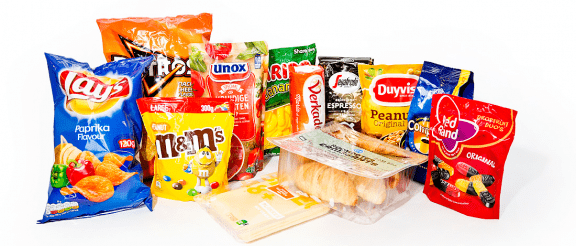Community of Practice Flexible Packaging
KIDV initiated a Community of Practice (CoP) with a consortium of companies facing similar challenges related to developing metallised flexible packaging that is suitable for the circular economy. The consortium members are FrieslandCampina, Intersnack, Jacobs Douwe Egberts, Mars Wrigley , Pepsico, Nestlé and Unilever.

The CoP will focus on implementing the CEFLEX Design for a Circular Economy Guidelines for this specific type of flexible packaging. CEFLEX is a collaborative initiative of a consortium of over 130 Europe-based companies, who together represent the full flexible packaging value chain. CEFLEX is aware of the CoP and very supportive of its goal to exchange knowledge in order to stimulate a circular economy for flexible packaging materials.
The CoP has identified the gap between the vision in the CEFLEX Guidelines and current practices of collection, sorting and recycling of flexible packaging. KIDV aims to support companies in bridging this gap by identifying the main challenges and finding solutions to these challenges.
“The gap identified by the CoP includes technical constraints as well as institutional challenges. We make a distinction between these; the technical constraints companies must overcome if they want to replace multi-layer PET, PE and PP packaging with flexible mono-materials such as OPP and LDPE on the one hand and the institutional challenges that prevent the establishment of the appropriate infrastructure for collecting, sorting and recycling mono-materials on the other hand”, says KIDV’s CoP leader Niels van Marle. “Ensuring the quality of the recycled materials from flexible packaging is key. In addition we will explore how to manage the potential impact of substances such as inks, barriers and metallisation when designing flexible packaging.”
The CoP will be organising round tables with other stakeholders in the packaging chain, including collectors, sorters, recyclers and retailers, in order to hear and discuss their views on these challenges and potential solutions. This process will be supported by knowledge institutes and experts in the field.
The CoP will create, agree and propose a roadmap for how to deal with the challenges regarding resource efficient metallised laminates used for packaging of crisps, coffee, confectionary and milk powder. The CoP launches with a core team and the learnings will be shared and evaluated with CEFLEX. If you operate in the flexible packaging value chain and are interested in future updates, please subscribe to our newsletter or contact KIDV.
This CoP is partly made possible by Stichting Afvalfonds.
Result 1: Roadmap Multilayer flexible packaging in a circular economy
The first result of the CoP is the Roadmap Multilayer flexible packaging in a circular economy. This Roadmap contains a technical view of current and future developments in the design and recycling of multilayer flexible plastic packaging. The KIDV outlines the technical dilemmas and puts forward eight possible solutions for making laminated packaging more circular, each with its own advantages and disadvantages. The roadmap will be used for a dialogue with stakeholders in the packaging value chain, which in three to five years' time and at a European level should lead to widely supported choices for tackling this complex issue.
Result 2: Webinar 'Unlocking the flexible packaging dilemma (11 february 2021)
More information about the programme and registration can be found here.
Dossier Multi-layer packaging
In 2019, the KIDV conducted research into the possibilities and alternatives for ten typical and frequently used plastic laminate packaging, which are currently difficult to recycle. Want to know more? Then check out our Dossier page: Multilayer packaging (Dutch, soon also available in English).
KIDV Recycle Check Flexible Plastic Packaging
Click here for the KIDV's current Recycle Check for flexible plastic packaging.